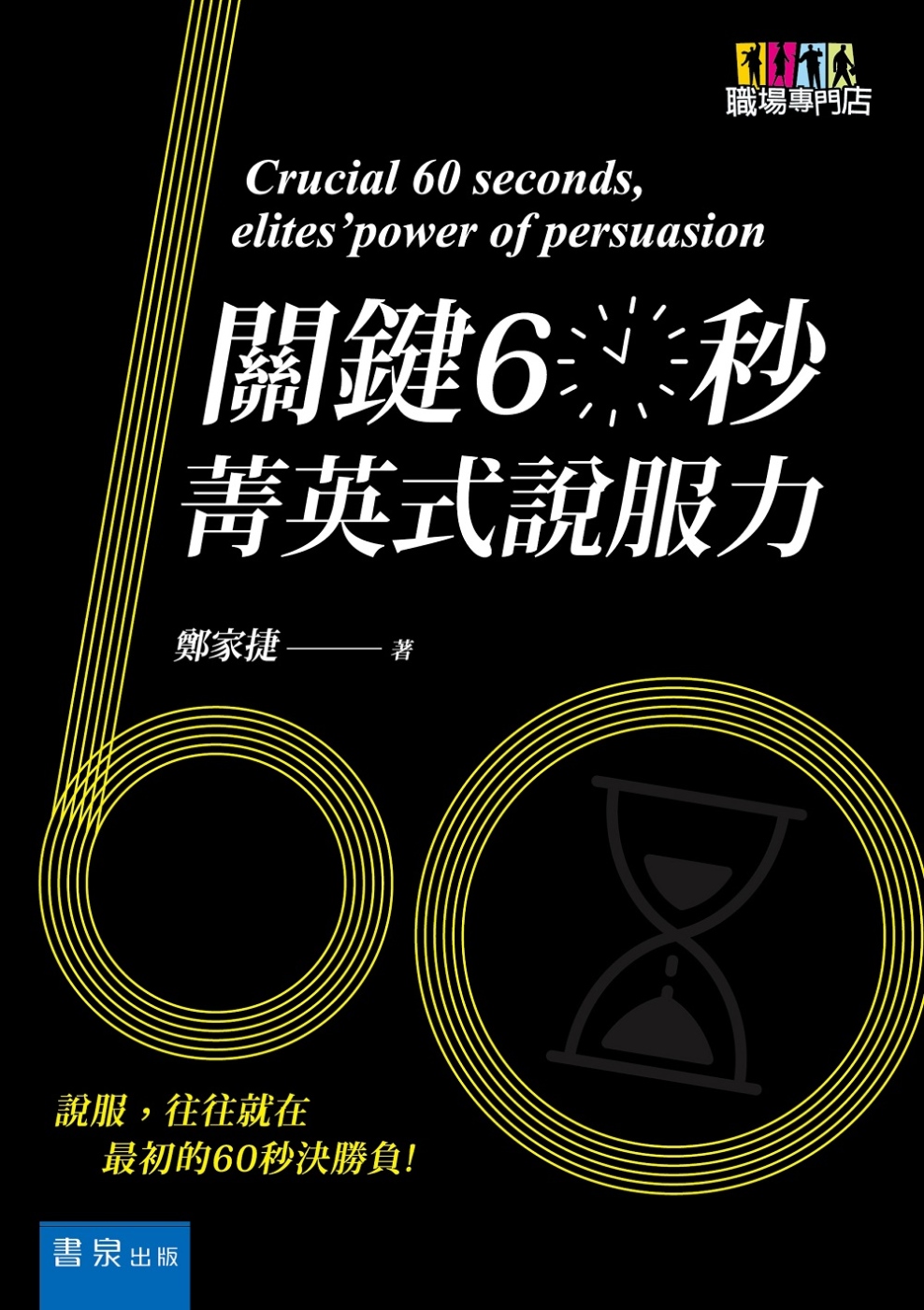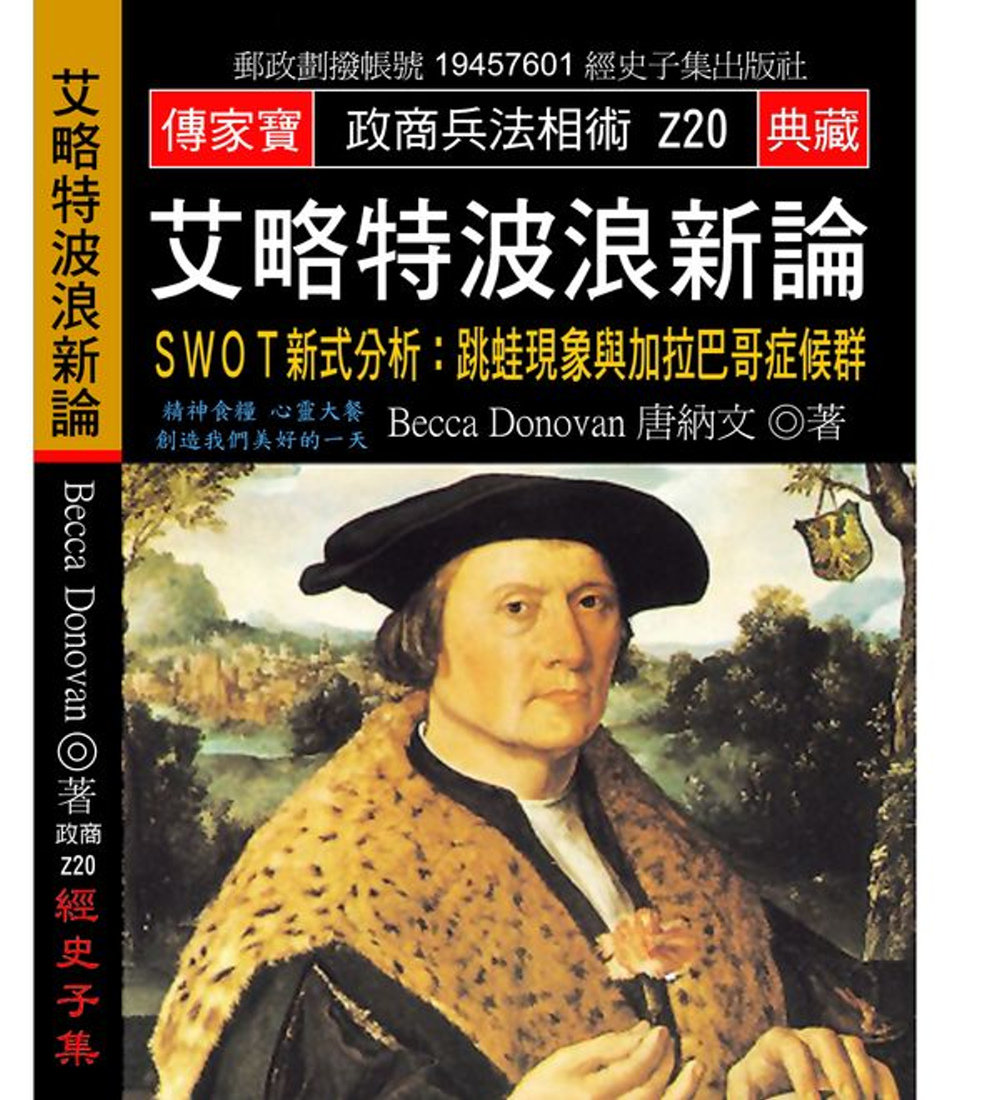關鍵60秒:菁英式說服力 | 美妙體態瑜珈在你家 - 2024年11月

關鍵60秒:菁英式說服力
說服,往往就在最初的60秒決勝負!
★在說服他人時,總是以「我認為」(in my opinion)開頭,不先介紹事實與資訊的話,對方哪知道你在說什麼?
★能夠表達出好的意見或判斷,才能顯現出一個人的價值;反之,則對這個人的能力產生懷疑。
★如果用英文表達不好,應該要思考的是,究竟是英文不夠流利,還是本身用中文思考就有問題?
說服力,是門說話的藝術,除了需要具備對事實觀察分析,且要輔以同理心,才能說到他人心坎裡,讓對方由衷的信任你。如何在60秒內迅速掌握對話重點,並建立屬於自己的觀點,更是一門大學問。
本書集結作者多年的教學經驗,採用實例讓讀者練習外,並以許多小故事增加趣味,並附上中英對照,除了學習說服力之外,也同時訓練英文口說,是一本無論在演說、談判甚至是辯論上都不可或缺的祕笈。
作者簡介
鄭家捷
美國聖路易大學法律學博士(J.D.)
美國紐約州律師
國立雲林科技大學應用外語系副教授
Forewords前言
My motivation to write this book我寫這本書的動機
Chapter one第一章
1.Introduction 1. 本書介紹
a.What will this book teach you? a. 這本書會教你什麼?
b.The relation between abilities required on speech, debate and negotiation b.演說、辯論和談判所需能力之間的關係
2.Training on asking questions and exploring possible answers: 2.提出問題與尋找答案的訓練:
a.Differences between the educational purposes of high schools and colleges a. 大學教育與高中教育目的的差異
b.To judge a tree from its fruits b. 由果實來判斷樹的好壞
c.Important notes c.重要提醒
d.Questions: d. 問題
3.Training on giving an opinion 3. 提出意見的訓練
a.The importance of having an opinion a. 意見的重要性
b.How an opinion is formed and challenged b. 意見如何形成與被挑戰
c.Cultural consideration on opinion forming c. 意見形成上的文化考量
Chapter Two第二章
Training on conversation對話的訓練
1.Importance of a conversation 1. 對話的重要性
2.How to make keep a conversation moving 2. 如何使使對話進行
3.Elements of conversation 3. 對話的要件
4.Factors affecting a conversation 4. 影響對話的因素
5.Other notes added for conversation training 5 關於對話訓練的其他要點
Chapter Three 第三章
Speech Training演說訓練
1.Some basic messages for this chapter 1. 關於本章的基本訊息
Formulating Process on Expression表達形成的過程
2.Purpose of Speech 2.演說的目的
What benefit can be procured from speech training? 從演說訓練中可以獲的什麼樣的好處?
What role can does a the purpose do inof a speech play?
演說的目的扮演什麼角色?
3.Facts and interpretation事實與詮釋
a.Observation in a classroom課堂觀察
b.Observation in a classroom
課堂觀察
4. Delivering a Message
訊息傳遞
5. To gain control at the beginning 在開始時候的掌控
6. How to conquer the fear when giving a public speech? 如何克服公開演說場合的恐懼?
7. How to intrigue interest through stories and examples
利用故事還有例子來刺激興趣
8. The benefits of giving a story in at the beginning
在一開始講故事的好處
9. Building up creditability through facts
透過事實建立起可信度
a. Observation in a classroom:
課堂觀察
b. A view in from a class corner of the class 課堂一角
10. Training of beginners對於初學者訓練
11. A note on self-introduction關於自我介紹的一些看法
12. Narration/ Description of facts事實的敘述
13. Further elaboration on the interpretation of facts對於事實解釋部分進一步的闡述
14. The followings are some advice with a few tips based on the past practice from students.
下列事項是依據學生們過去的表現列出以下建議
15. Sample Speech and Writing at the Intermediate Level演說和中級寫作示範
16. Summary摘要
17. Impromptu Speech即席演說
18. Observation in a classroom: 18. 課堂觀察
19. The application of the approaches learned from this chapter:本章方法的適用
Chapter four第四章
Debate辯論
1. Why should we learn debate? 我們為什麼要學習辯論
2. Critical Thinking Resulting from Doubt批判性思考源自於懷疑
3. Training of debate辯論的訓練
a. General composition of an argument辯論的結構
A. Difference between a speech and a debate演說與辯論的差異
B. Refutation反駁
C. Evaluating facts with a standard以標準來檢驗事實
D. Cause and effect in a sentence在一個句子中的因果關係
E. Cause and effect in a paragraph段落中的因果關係
F. Issue and a focal point: 爭議點與中心點
G. Examination of an Argument: 對於辯詞的檢驗
H. Finding out the standard that is applied 找出適用的標準
I. PRACTICE ON THE GMAT ESSAY QUESTIONS GMAT題目練習
J. Method used in reasoning 論理的方法
K. How to form a framework for a debate 如何建立辯論的架構
L. Importance of A Summary and the introduction of IRAC 摘要的重要性以及IRAC介紹
M. Memorandum for argument 辯論備忘錄
N. Preparation and practice on topics for debate 辯論題目的準備與實踐
O. Common Mistakes Made in Writings 寫作上常犯的錯誤
序
Forewords
My motivation to write this book Thirty years ago when I was in Saint Louis Law School, one day a good friend of mine asked me one question. “John, what is the difference between students in Saint Louis Law and Harvard Law?” I told him that they were in Harvard because they were more intelligent and studied harder. He said, “Not exactly, they already knew what they would do in the future when they were 12 years old when we only knew how to play baseball.” Ten years later, my friend, by his keen observation and strong persuasive power, became a very famous football agent in the U.S., building his own empire with his empty hands. As an old Chinese saying goes, “ice of three inches thick cannot be made overnight.” If you are weak in your power of persuasion, such weakness probably has lasted a long time and certainly cannot be cured overnight.
My motivation to write this book is simple, to build up the students’ ability on persuasion in speaking, debating, writing and negotiation. I have taught English speech, debate and writing in college and have worked as an international attorney for over ten years. In the past ten years, I have noticed that many students with a high English proficiency, including some from mainland China, can neither talk nor write on topics assigned as those found in ILTS and TOEFL. When I inquired further, I was informed that they had spent time and effort in high school on being trained to read and listen rather than write, not to mention to deliver a speech on certain topics. To my surprise, they have never learned how to write even in their Chinese class either. In many cases, they had great difficulty in giving opinions. Most of them have no problem with their English proficiency. English is a tool helpful in communicating with foreigners and exchanging ideas. They spent plenty of time on learning English to achieve a high English proficiency, but they have never learned how to form their opinions by observing and formulating ideas. In their process of learning, they failed to understand that English is a tool rather than their final goal in the future. As an intellectual, you have to be able to express your own thinking and opinion. Your own opinion is the first step of training in persuasive speech, debate, writing and negotiation. What is more important here is that prior to discussing your own opinion, you have to be trained on providing descriptive facts or information from your observation.
The problem on how to establish an opinion is not limited to college students but encountered by business persons as well. In the past ten years, I worked as an international attorney to help some local companies with their international disputes including overseas litigations, mediations and settlements. In a business world, power on persuasion is important. To persuade others to accept what you say, which is an opinion with a conclusion, you must take a position first. To form an opinion, facts must be carefully observed, clearly described and be further analyzed. This task is the first priority in the management of any business decision, especially in disputes. This process requires a series of logical organization. Logical organization starts from a clear description of facts resulting into a well elaborated opinion subsequent to a logical analysis. Quite unfortunately, many business persons do not have sufficient training in this field. In many occasions where business disputes are involved, people who are in charge of this responsibility cannot give a clear description of relevant facts, not to mention spotting issues with a possible proposed solution. I am not referring only to a junior level regarding customer service, but also to a senior management level on this point. I hope this book can help some students as well as business persons who need help in their writing, speaking and negotiation.
前言
我寫這本書的動機
三十年前,我還在美國聖路易大學法學院讀書的時候,有一天我的一個好朋友問我一個問題,「我們的學生跟哈佛法學院的學生差異在哪裡?」我告訴他哈佛的學生他們比較聰明,也比較用功。他說「不完全是,哈佛的學生當他們12 歲時就知道他們將來要做什麼,而我們12 歲的時候只知道怎麼打棒球」。十年之後我的朋友,憑著他的敏銳觀察力和說服力,變成美國非常有名的足球經紀人,空手建立了他自己的王國。就像中國的成語所說:「冰凍三尺,非一日之寒。」任何問題不是一個晚上造成的。如果你的說服力上是薄弱的,這個問題可能已經存在很久,當然也不可能在一個晚上就解決。
我寫這本書的動機起因很簡單,幫助學生在說話、辯論、還有談判上建立說服的能力。我在大學裡面教授英文演說、辯論、英文寫作以及從事國際律師業務超過十年的時間。在過去的十年當中,我發現學生們包括一些大陸學生即使有了很好的英文能力,也很難針對特定的議題發表談話或寫作,比方像雅思或是托福的口語或是作文題目。當我進一步詢問的時候,我才被告知他們在高中時花了很多時間在閱讀和聽力訓練,而非寫作,更不用談對於特定的議題進行演說。我甚至很驚訝的發現他們也沒有學過中文作文。事實上,在很多場合他們跟外國人交談是有很大的困難,但他們絕大部分英語水平並沒有問題。英文是一項幫助溝通或是交換想法的工具,學生們花了很多的時間學習英文甚至達到優異的英文能力,但是他們從來沒有學過如何觀察、整理想法以及形成他們自己的意見。在他們的學習過程中,他們忘記了英文只是一個工具而不是他們未來最後的目標。身為一個知識分子,你必須有你自己的想法和意見,而你自己的想法就是訓練具有說服力的演說辯論和談判的第一步。而更重要的是,在討論你自己個人意見之前,你應該要被訓練的是如何客觀的描述你所觀察到的事實和資訊。
如何形成一個意見?這樣的問題並不限於大學生,也包括了一些商務人士。在過去的十年當中我也以國際商務律師的身分,幫助了一些當地的公司處理他們國際糾紛,包括訴訟案件、協調與和解。在商業世界,無論任何情況,說服別人是很重要的工作。要達到說服的目的,意見,其實也就是結論,必須要先建立。要建立一個意見,事實必須小心的觀察以及清楚的陳述,這是處理任何商業糾紛第一件要做的事情。這需要一個邏輯的組織。邏輯的組織就是從清楚的事實描述開始,經過邏輯的分析而形成清楚解釋的意見。很不幸地,許多商務人士在這方面並沒有足夠的訓練。在許多商業糾紛的場合,負責處理糾紛的人員常常不能夠對於相關事實清楚的描述,更不用找出可能的爭議以及提出可能解決的辦法。在這一點上,我不只是說客戶服務部門的資淺階層,也包括資深的管理階層。我希望這本書對於寫作、說話以及談判上有所需要的學生以及商務人士,能夠有所幫助。
(1) What will this book teach you? Many books are offered in bookstores regarding speeches and negotiations. They talk about techniques and skills gleaned from theories and practices, illustrated with interesting stories on personal experiences in a bargaining process in the market. People like to listen to stories and no doubt can be benefitted from the experiences shared by the authors. Can these stories and experiences help to build up negotiating skills required in business? To explore further, can these easy and fast learning skills really help those who have no ability in regard to speaking or analytical thinking? (1) 這本書會教你什麼? 書店裡有許多關於演說跟談判的書籍,他們從許多學說與實驗中取得的技巧,搭配在市場上討價還價當中的個人經驗的有趣故事,喜歡聽故事的人當然可以從作者的經驗中學到很多,但這些故事跟個人經驗能夠幫忙建立在商場上所需要的談判技術嗎?更進一步地探討,這一些簡單與學習快速的方法能夠真正幫助那些不能夠開口說話也無法分析思考的學習者嗎? If we view a good negotiator as the person who is able either to reach a good deal or to place himself/his team in a better position through communication, then we no doubt can say that a good negotiator should be a good communicator. In fact, a good negotiator should be someone who is more than a communicator.
 愚物語
愚物語 輕鬆有效的魚式游泳(書+4DVD)
輕鬆有效的魚式游泳(書+4DVD) 【小手拉拉4冊套書】限量加贈禮物版...
【小手拉拉4冊套書】限量加贈禮物版... 小手拉拉:青蛙王子
小手拉拉:青蛙王子 青蛙小王子
青蛙小王子 艾略特波浪新論 SWOT新式分析:...
艾略特波浪新論 SWOT新式分析:... 恆春半島祕境四季遊:旭海‧東源‧高...
恆春半島祕境四季遊:旭海‧東源‧高... 蛙現台灣
蛙現台灣 鋼鐵白兔騎士團Ⅰ
鋼鐵白兔騎士團Ⅰ 2012諾貝爾獎得主莫言長篇代表作...
2012諾貝爾獎得主莫言長篇代表作...